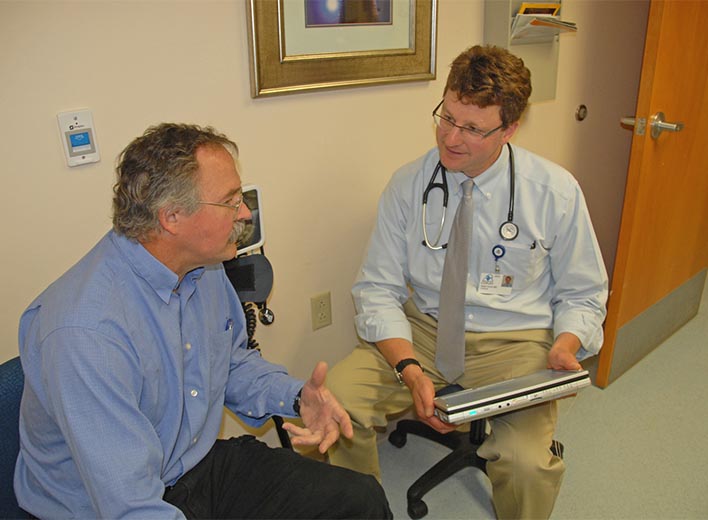Cardiopulmonary Rehabilitation
Improve Your Quality of Life
![]()
Copley Hospital’s Cardiopulmonary Rehabilitation Program helps improve your quality of life following a heart event such as a heart attack or for those diagnosed with lung disease.
Our cardiac rehabilitation and pulmonary rehabilitation treatment programs are geared towards helping you reach a higher level of functioning through exercise and new skills to better manage your condition.
What is Cardiac Rehabilitation?
Copley’s Cardiac Rehabilitation Program offers an individualized and personalized treatment plan, including evaluation and instruction on physical activity, nutrition, stress management, and other health related areas.
Cardiac Rehabilitation is an important part of the treatment of your specific heart problem. If you have one of the following diagnoses, you may be eligible to participate:
- Heart Attack
- Angina
- Coronary artery angioplasty or stents
- Open heart surgery such as coronary bypass or valve surgery
- Heart failure
- Heart transplantation
- Congestive Heart Failure within an EF<= 35%
Recent scientific studies have shown that people who complete a cardiac rehabilitation program can increase their life expectancy by up to five years.

Contact Information
802.888.8230
Monday, Wednesday, and Friday Cardiac Rehab (Mornings), Pulmonary Rehab (Afternoons)
Location:
Copley Hospital
528 Washington Highway
Morrisville, VT 05661
Team:
Jennifer Moltz, PT
Jen Piette, RT
Dennis Ryan, PTA
Daisy Williams, PT
Benefits of Cardiac Rehabilitation
- Improve your quality of life and lessen your chances for another heart attack
- Control heart disease symptoms such as chest pain or shortness of breath
- Slow down or limit damage to your blood vessels in your heart
- Lessen the physical and emotional effects of heart disease
- Improve your stamina and strength, getting you back to your usual activities, including work, hobbies, and regular exercise
- Improve your confidence and well-being
Cardiac Rehabilitation Offers
- Assessment of your personal risk factors for heart and blood vessel disease
- Education and support to make healthy lifestyle changes such as: maintaining a healthy weight, heart healthy eating, avoiding tobacco and environmental smoke
- Beginning and maintaining a personalized exercise plan that works for you
- Monitoring and better control of: blood pressure, lipids/cholesterol, stress assessment and guidance, diabetes/blood sugars
- Improved communication with your doctor and other healthcare providers about your progress following your cardiac event
- Opportunity to meet and share stories with other patients like you
What is Pulmonary Rehabilitation?
Pulmonary rehabilitation is a service that is designed for those who experience lung problems such as:
- Chronic Obstructive Pulmonary Disease (COPD)
- Emphysema
- Chronic Bronchitis
- Bronchiectasis
- Sarcoidosis
- Pulmonary Hypertension
- Pulmonary Fibrosis
- Interstitial lung disease
- Lung cancer and lung cancer surgery
- Lung volume reduction surgery before and after lung transplantation
- Other restrictive lung diseases
Pulmonary Rehabilitation allows you to make the most of the limited lung function you have.
Pulmonary Rehabilitation (PR) helps you to improve your quality of life. Although PR can’t cure your lung disease, it can be of great benefit and you may notice improved breathing effort and less breathing problems.
Other benefits include:
- Decrease the symptoms of your disease or condition
- Ability to function better in your daily life
- Increased ability to exercise
- Decreased symptoms and better management of anxiety and depression
Pulmonary Rehabilitation Offers
![]()
Educational Programs – the education classes focus on COPD as well as other chronic lung diseases to provide you with information about:
- Medications, including drug action, side effects, using an inhaler, and self-care techniques
- Understanding and using oxygen therapy
- Diet, nutrition, and weight management
- Breathing retraining and energy conservation techniques
- Importance of exercise
- Strategies for managing breathing problems
- Symptom assessment and knowledge about when to seek medical treatment
Monitored and supervised exercise – a physical activity plan is tailored to your needs. Exercise will help improve your endurance and muscle strength, so you’re better able to carry out daily activities.
Psychosocial support – People who have chronic lung diseases are more prone to depression, anxiety, and other emotional problems. The PR team can help provide guidance in these areas.
To Get Started on a Cardiopulmonary Rehabilitation Program
We require a referral from your cardiologist, pulmonologist or primary care physician with a qualifying diagnosis.
We will schedule an initial evaluation with you during which we will determine a baseline level of function and work with you to develop your personal goals and work plan.
We ask that you quit smoking before beginning the program.
